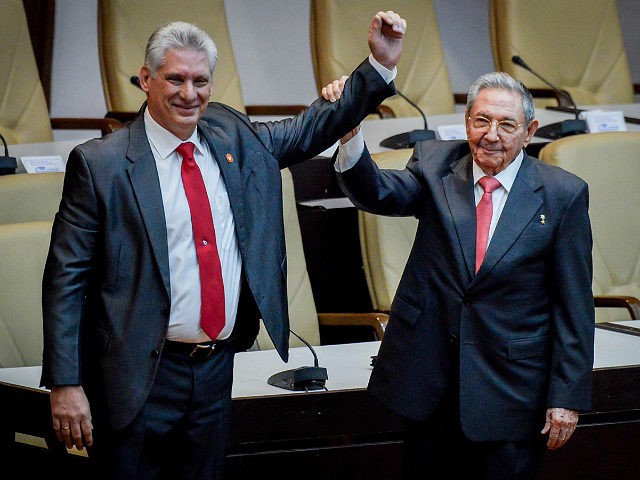Presidents Xi Jinping and Vladimir Putin of China and Russia, respectively, reached out Thursday to the newly appointed head of Cuba’s National Assembly, Miguel Díaz-Canel, congratulating him on acquiring the title of “president.”
In Cuba – as in China – the title of “president” is largely ceremonial. The real power lies in the hands of the Communist Party leader and the commander-in-chief of the armed forces, according to the constitution. Raúl Castro has kept both of those titles but stepped down from being “president,” granting the title to Díaz-Canel.
In his first remarks as president, Díaz-Canel repeatedly clarified that Castro would remain at the helm of the country. Castro “will preside over all major decisions for the present and future of the nation,” he told the Communist Party-run National Assembly, vowing to remain loyal to the communist principles of the Revolution and not attempt to reform any Castro policies.
Chinese Communist Party leader Xi Jinping was among the first to send a congratulatory message to Havana. According to the state news agency Xinhua, Xi told Díaz-Canel “that China and Cuba are good comrades, good friends and good partners that sincerely trust each other and share the same fate, adding that the two peoples have cultivated deep friendship through long and hard struggles, serving as a strong force to promote the development of bilateral ties.”
“China is willing to join Cuba on the way forward,” Xi reportedly said, telling Díaz-Canel personally that he is “willing to work with” him “to deepen and expand bilateral cooperation, and achieve new accomplishments.”
Notably, Xinhua reports that Xi sent a separate message to the actual leader of the Cuban government, Raúl Castro, confirming that his overture to Díaz-Canel did not mean he would neglect his relationship with Castro.
In Moscow, Vladimir Putin – who himself won a highly troubled presidential race with 77 percent of the vote last month – also ingratiated his country with the new president.
The Kremlin news service reported that Putin “expressed his confidence that the country will continue to achieve the goals proclaimed after the Cuban revolution under new leadership, and that it will reach new milestones of social and economic development.”
Putin also “confirmed that Russia is ready to continue strengthening strategic partnership with Cuba and constructive cooperation in all spheres.”
Like China, Russia’s government also made sure to send a note to Castro. Putin told Castro that he is “much respected in Russia and is considered a true friend of the nation, a wise and forward-looking politician who has contributed to the resolution of many crucial social and economic issues in Cuba.”
China and Russia were not the only nations to send their congratulations, but they were the largest. Among other nations to congratulate Díaz-Canel were Bolivia and Venezuela, Cuba’s closest ally. In a Twitter post, Venezuelan dictator Nicolás Maduro wrote:
In the name of the Bolivarian Government of Venezuela I congratulate the new President of the Republic of Cuba, Miguel Díaz-Canel. We will keep working like brother nations for the consolidation of the Great Nation and guaranteeing social rights for our peoples.
En nombre del Gobierno Bolivariano de Venezuela felicito al nuevo Presidente de la República de Cuba, Miguel Díaz-Canel. Seguiremos trabajando como pueblos hermanos por la consolidación de la Patria Grande y garantizando derechos sociales para nuestros pueblos. pic.twitter.com/atfufvO4Cj
— Nicolás Maduro (@NicolasMaduro) April 19, 2018
The Trump administration expressed far less optimism in welcoming the news.
“We are disappointed that the Cuban Government opted to silence independent voices and maintain its repressive monopoly on power rather than allow its people a meaningful choice through free, fair, and competitive elections,” State Department spokeswoman Heather Nauert told reporters on Thursday. “We urge the new president to listen and respond to Cuban citizens’ demands for a more prosperous, free, and democratic Cuba.”
Nauert confirmed that President Donald Trump has not agreed to any contact with Díaz-Canel at the moment.
Russia and China have both been vying for close ties to Cuba, lying merely 90 miles from U.S. shores, for decades. Yet Cuba’s battered economy – destroyed by over half a century of Communist Party corruption – has become a liability even for those two states, who have swung back and forth from compromising their own economies with ties to Cuba to attempting to manipulate their friendly relations into leverage in the Western Hemisphere.
China became Cuba’s largest trading partner in October 2017. Yet little over a month later, Beijing expressed extreme concern that Cuba’s weak economy could hurt its own.
“This year, Cuba’s exports to China must grow at an impressive rate. However, China’s exports to Cuba are experiencing difficult times and the pressure continues for many businessmen due to the economic difficulties this Caribbean nation is going through,” Hong Xiao, an economic and commercial counselor at the Chinese embassy in Havana, said in December.
Cuba dropped its exports to Cuba by 29.8 percent between 2016 and 2017, even as it rose to become the nation’s largest trading partner. Meanwhile, Chinese government agents began turning to other Latin American states to hedge their bets on Cuba.
Russia has had a similar experience with the Cuban economy. The Soviet Union largely bankrolled the Cuban Revolution after Fidel Castro declared himself a communist in 1961. With the collapse of the Soviet Union, Cuba experienced an economic downturn known as the “special period,” only completely overcome by the colonization of Venezuela. Socialism has since ravaged the Venezuelan economy, leaving Cuba to turn to Russia yet again.
This time, however, Havana is expected to pay. A year ago, an incensed Moscow demanded that Cuba pay for the oil it bought to replace its Venezuelan supply.
“Cuba really wants more supplies, but the question is in financial sources. If financial resources are found – the companies will deliver,” Russian Energy Minister Alexander Novak said. “It’s not charity.”

COMMENTS
Please let us know if you're having issues with commenting.